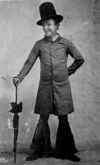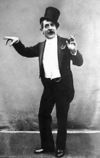Pages 189-205
This page-by-page annotation is organized by sections, as delineated by the seven squares (sprockets) which separate each section. The page numbers for this page-by-page annotation are for the original Viking edition (760 pages). Editions by other publishers vary in pagination — the newer Penguin editions are 776 pages; the Bantam edition is 886 pages.
Contributors: Please use a 760-page edition (either the original Viking edition with the orange cover or the Penguin USA edition with the blue cover and rocket diagram — there are plenty on Ebay for around $10) or search the Google edition for the correct page number. Readers: To calculate the Bantam edition use this formula: Bantam page # x 1.165. Before p.50 it's about a page earlier; as you get later in the book, add a page.
Finally, profound thanks to Prof. Don Larsson for providing the foundation for this page-by-page annotation.
Page 189
189.20 Grischa
Diminutive of Grigori
189.30-31 another episode in some huge pathological dream of Stalin's
Whether intended or not, this brought to mind the Dream of the Red King in Alice in Wonderland. People in Soviet Russia were real, like Alice, only in that they exist in the Red King's (Stalin) dreams. And as Alice learned, crying can only make matters worse: her tears cannot make her any more real and crying risks waking the king -- in which case, of course, no more Alice.
Page 190
190.8 pirozhok
An individual-sized baked or fried bun stuffed with a variety of fillings; a pirog (plural pirogi) is a full-sized pie
190.23 RHIP
"Rank has its privileges."
190.32 Wormwood Scrubs School Tie
Wormwood Scrubs Prison, in London, was built by convicts in 1874; that Slothrop would wear a prison school tie says a lot about his (and Pynchon's) sense of humor. Hand-painted ties also feature in Inherent Vice.
Page 192
192.15-16 humming "You Can Do a Lot of Things at the Seaside That You Can’t Do in Town"This pre-World War I British music hall tune was composed by Mark Sheridan. It appears as the "B" side of his recording of the early WWI song "Belgium Put the Kibosh on the Kaiser."
Page 194
194.6 Himmler-Spielsaal
German: Himmler-Gameroom; named after Heinrich Himmler, head of the SS and a Nazi leader
194.6-7 chemin-de-fer
French: 'railroad'; but in this case a version of Baccarat, as it was originally introduced in France
194.18 Choate
A prep school in Wallingford, Connecticut; now known as Choate Rosemary Hall after a merger in 1971 of two eminent single-sex establishments.
Page 198
198.19-21 My little chickadee...gets in bed w-with that goat?
My Little Chickadee (1940) is a Universal comedy/western motion picture starring Mae West and W. C. Fields. Fields (of course) ends up in bed with a goat.
Clip.
Page 200
200.5-6 They are playing croquet.
The surreal quality of a treed Slothrop landing in the midst of senior officers and plump ladies playing croquet brings to mind Alice playing croquet with the plump Queen of Hearts, the King of Hearts and their court in Alice in Wonderland.
Page 201
201.5 Lawrence of Arabia
Lawrence did not command regular troops in the Mediterranean Theatre, as described by Weisenburger, but led Arab partisan operations against the Turks during the war. The subaltern’s snide remarks to Slothrop echo the scene in David Lean's 1962 Lawrence of Arabia when Lawrence (Peter O'Toole) first appears at British headquarters in Cairo wearing Arab clothing.
Page 203
203.34 Bwa-deboolongIt is no wonder that Weisenburger cannot find a Bois de Boulogne in Monaco: The reference is actually to a turn-of-the-century music hall tune, "The Man Who Broke the Bank at Monte Carlo," by Fred Gilbert. The persona of the song is a man who has recently returned to Paris after a streak of luck at the tables. The chorus:
- As I walk along the Bois de Boulogne
- With an independent air,
- You can hear the girls declare,
- "There goes a millionaire!"
- You can hear them sigh and wish to die,
- You can see them wink the other eye
- At the man who broke the bank at Monte Carlo.
The song crops up in several films, notably in Orson Welles’ The Magnificent Ambersons (1942). The song’s meter is also echoed in the "Vulgar Song" at p.213.20-30 and the song at p244.13-16. The song was made very popular by performer Charles Coborn, who was still making appearances at music halls until his death in 1945. Audio clips of Coborn performing are available here.
| 1 Beyond the Zero |
3-7, 7-16, 17-19, 20-29, 29-37, 37-42, 42-47, 47-53, 53-60, 60-71, 71-72, 72-83, 83-92, 92-113, 114-120, 120-136, 136-144, 145-154, 154-167, 167-174, 174-177 |
|---|---|
| 2 Un Perm' au Casino Herman Goering |
181-189, 189-205, 205-226, 226-236, 236-244, 244-249, 249-269, 269-278 |
| 3 In the Zone |
279-295, 295-314, 314-329, 329-336, 336-359, 359-371, 371-383, 383-390, 390-392, 392-397, 397-433, 433-447, 448-456, 457-468, 468-472, 473-482, 482-488, 488-491, 492-505, 505-518, 518-525, 525-532, 532-536, 537-548, 549-557, 557-563, 563-566, 567-577, 577-580, 580-591, 591-610, 610-616 |
| 4 The Counterforce |
617-626, 626-640, 640-655, 656-663, 663-673, 674-700, 700-706, 706-717, 717-724, 724-733, 733-735, 735-760 |

